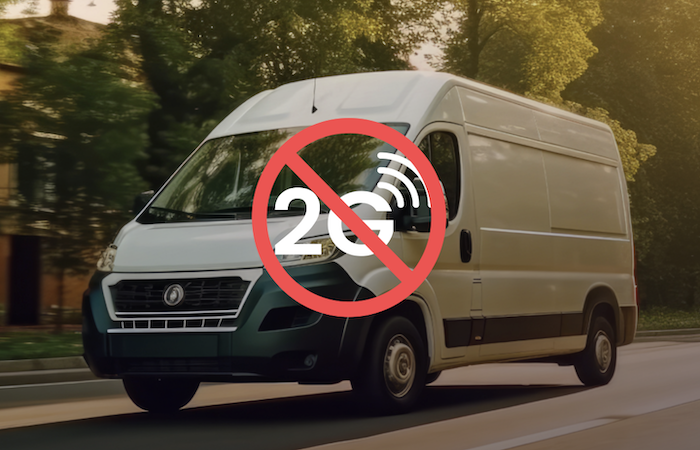Upgrading the technology in your fleet can often be a costly and time-consuming challenge. But sometimes, it’s required. In the upcoming years, 2G networks all over the world will shut down and your vehicles will need new 4G hardware to connect to the internet.
Say goodbye to the old, and welcome to the new. The worldwide 2G network is shutting down in the upcoming years, and everyone who is using technology connected to the internet might be affected.
The service, transport and machinery industry are no exceptions. Digital services, such as tachographs, travel logs and fleet management systems, all use the internet and rely on good signal and stable connections. But if you’re one of the many companies still using 2G, you need to make a plan to transition to 4G.
Why is 2G shutting down?
This technology shift is globally known as “sunsetting”. And it is happening because of the increased demand for data communication that requires newer technologies like 4G and 5G.
The solution to shut down the 2G network is a way to futureproof new technology, and reuse frequencies that are safer and more robust. Because after all, there’s only so much bandwidth to go around.
When is the shutdown happening?
The end date varies from country to country, but in a couple of years, all countries will have replaced their 2G network.
- In Sweden, the 2G shutdown is starting in December 2025 (for every operator except Telia).
- In Finland, the 2G shutdown is starting in December 2029.
- In Denmark, the 2G shutdown is starting sometime during 2029.
- In Norway, the 2G shutdown is starting by the end of 2025.
This information is subject to change, so please verify the shutdown date specific to your country and region for the most up-to-date details. But either way, the sooner you start to phase out your 2G reliant technologies, the better. If you wait until the very last minute, you might have trouble finding available services and hardware.
How is this affecting you and your fleet?
IoT devices that use 2G to function need to be upgraded or replaced. But don’t see this as an unnecessary, costly hurdle to be handled. There are many benefits to using equipment with 4G connectivity, which will help you optimize your fleet management processes and grow your business.
Benefits of using 4G in your fleet:
- Fast positioning
4G networks offer faster data transfer rates, enabling real-time communication between vehicles and fleet management systems. This means you’ll get quicker updates on vehicle location, fuel usage, drive behavior and other critical data.
- Accurate positioning
With 4G, GPS tracking data can be updated more frequently, providing a more accurate and up-to-date overview of vehicle movements.
- Wider network coverage
You will get better and more consistent coverage in more areas, including rural areas. This means fewer communication gaps and stronger, more reliable signals.
- Improved scalability
4G networks are built to support a large number of connected devices, making it easier to scale up fleet management solutions without risking network congestion or slowdowns, which can happen with 2G.
Create a plan for migration
Once you know which devices need to be replaced and when, you should create a timeline and plan of the migration to another solution.
Right now, you get the first 3 months free when switching to a GSFleet Travel log or our Enterprise Fleet management solution. We’ll help you set everything up, send you easy-to-install hardware (if you need it), and give you local support every step of the way.
